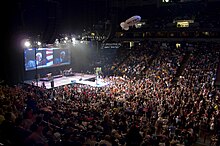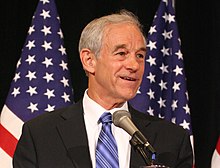Ron Paul
In 1976, Paul formed the Foundation for Rational Economics and Education (FREE), and in 1985 was named the first chairman of the conservative PAC Citizens for a Sound Economy, both free-market groups focused on limited government.
[10] Finishing in the top four with delegates in both races (while winning four states in the 2012 primaries), he refused to endorse the Republican nominations of John McCain and Mitt Romney during their respective 2008 and 2012 campaigns against Barack Obama.
Paul remained active after his retirement from electoral politics, giving speeches promoting libertarian and libertarian-conservative ideas on college campuses.
[22] While a medical resident in the 1960s, Paul was influenced by Friedrich Hayek's The Road to Serfdom, which caused him to read other publications by Ludwig von Mises and Ayn Rand.
[21] President Gerald Ford later appointed Casey to the Federal Maritime Commission, and Paul won an April 1976 special election to the vacant office after a runoff.
[36][37] In 1984, Paul became the first chairman of the Citizens for a Sound Economy (CSE),[3] a conservative political group founded by Charles and David Koch "to fight for less government, lower taxes, and less regulation."
[58] According to Paul, his presidential campaign was about more than obtaining office; he sought to promote his libertarian ideas, often to school and university groups regardless of vote eligibility.
[68] The sole measure authored by Paul that was ultimately enacted allowed for a federal customhouse to be sold to a local historic preservation society (H.R.
[69] In November 1997, Paul was one of eighteen Republicans in the House to co-sponsor a resolution by Bob Barr that sought to launch an impeachment inquiry against President Bill Clinton.
[74][75][76][77] Two days prior, on December 16, Paul had stated that he would vote to impeach based on Clinton's military attacks in the Middle East, namely the 1998 bombing of Iraq and Operation Infinite Reach, and not necessarily the Lewinsky scandal, which he described as far less serious than the "unconstitutionality of presidents waging wars".
[78] Paul was honorary chairman of, and is a member of the Republican Liberty Caucus, a political action committee that describes its goal as electing "liberty-minded, limited-government individuals".
[81] With the election of the 112th Congress, and a resulting GOP majority in the House, Paul became the chairman of the Subcommittee on Domestic Monetary Policy and Technology starting in January 2011.
[95][96] By March, front-runner John McCain had secured enough pledged delegates to guarantee that he would win the nomination, and Romney and Mike Huckabee had both formally withdrawn from the race.
He said that each of them had pledged to adhere to a policy of balancing budgets, bringing the troops home, defending privacy and personal liberties, and investigating the Federal Reserve.
[112] Paul won several early straw polls for the 2012 Republican presidential nomination[113] and formed an official exploratory committee in late April 2011.
[124] In court papers filed in August 2014, Sorenson said that he had been paid by both presidential campaigns for his endorsement and pled guilty to criminal charges stemming from the incident.
"[148] He expressed his disgust with the political culture of both major parties in a speech delivered in 1984 upon resigning from the House of Representatives to prepare for a (failed) run for the Senate, and he eventually apologized to his libertarian friends for having supported Reagan.
"[171] Following the Orange Revolution protests in 2004, which led to Viktor Yanukovych's ouster from government, Paul accused the National Endowment for Democracy of having staged a coup in Ukraine.
[172][173] Paul supported the 2014 Crimean status referendum,[174] for which he was called a friend of Vladimir Putin by The Atlantic,[175] and has objected to sanctions during the Russo-Ukrainian War and foreign aid to Ukraine.
"[178] After the April 2013 Boston Marathon bombing, Paul commented on the tactics used by governing forces into a harsh criticism that he has written as a "military-style occupation of an American city".
[185][186] From 1999 until his retirement, he introduced bills into each Congress seeking to eliminate the Federal Reserve System in a single year,[187][188][189] a position he outlines in his 2009 book End the Fed.
"[190] Paul has described his interest in ending wars and lowering military spending as partly an "economic issue", adding, "We'd save a lot of money by not being engaged [in overseas conflict] like this.
He pushes to eliminate federal involvement with and management of health care, which he argues would allow prices to decrease due to the fundamental dynamics of a free market.
"[201] Paul wrote the remarks in a post on his Congressional website in one of his final public statements as a member of Congress, noting that many petitions had been submitted to the White House calling for secession in the wake of the November 2012 election.
[207] His abortion-related legislation, such as the Sanctity of Life Act in 2005, is intended to negate Roe v. Wade and to get "the federal government completely out of the business of regulating state matters.
[209][210] Paul was critical of the Civil Rights Act of 1964, arguing that it sanctioned federal interference in the labor market and did not improve race relations.
He once remarked: "The Civil Rights Act of 1964 not only violated the Constitution and reduced individual liberty; it also failed to achieve its stated goals of promoting racial harmony and a color-blind society".
[224] In June 2013, Paul criticized the NSA surveillance program and praised Edward Snowden for having performed a "great service to the American people by exposing the truth about what our government is doing in secret".
[225] In April 2015, Paul began appearing in infomercials for Stansberry & Associates Investment Research, warning about an upcoming financial meltdown as a result of the imminent crash of the world's currencies.
In August 2017, he said that Americans don't see Afghanistan as a threat to their personal security and being aggressive in foreign policy only loses Trump some of his support base.












